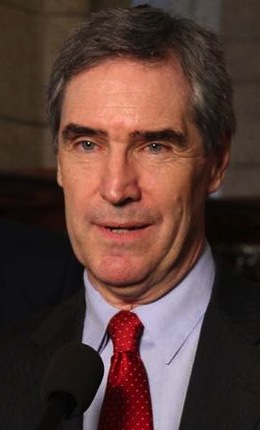When we contemplate the Liberals and New Democrats, many of us in English Canada who are opposed to the government of Prime Minister Stephen Harper are inevitably asking ourselves today: “What were they thinking?”
The answer, presumably, hinges on the idea that it doesn’t take much movement in public opinion to make a significant difference in the outcome of a federal election in a country in Canada’s particular circumstances.
Two national polls taken in the last few days illustrate this.
The Nanos Research poll, which was in the field between March 12 and March 15, and the Ipsos Reid poll that was in the field on March 22 and March 23, seemingly showed dramatically divergent results.
If the first is to be believed, the situation after election day will be virtually unchanged from the present — another Conservative minority without enough seats between the Liberals and the NDP to form a coalition even if they were contemplating such a thing.
The second suggests a comfortable Conservative majority, probably of about 20 seats, certainly enough to contemplate ruling the country unthreatened by political challenges for a full constitutional term.
Yet if we look closely at the two polls’ results, only four percentage points apart in their indication of popular support for the Harper Conservatives, they are really telling the same story — each within the margin of error of the other.
“That 4 per cent is what makes the difference between a comfortable majority and a minority, so movement by the electorate of three or four points is hugely critical,” said Alberta pollster Janet Brown yesterday.
Alas, observes Brown, a poll of only about 1,000 respondents (Nanos had 1,216; Ipsos Reid had 1,001) is not really big enough to give a clear picture of what Canadians are about to do in a country of regions with vastly different voting behaviour and traditions.
Fair enough, but looked at without the filter of spin and the far-right headline ideology that drives most of the mainstream media, the picture painted by the two polls has the ring of truth. Probably, if the election were scheduled to take place this morning, instead of a few weeks from now, Harper and his Conservatives would eke out a majority a little smaller than the upper end of the Ipsos Reid poll’s range, which was touted so assiduously by Postmedia News.
What the situation will be on election day can only be speculated upon for the moment, of course, although Brown cautions us that for the past three federal elections polls have been very volatile.
Which leads us back to the original question, what were the opposition parties thinking when they declared the government to be in contempt of Parliament and brought it down? Really, why force an election when the results seem likely to be worse than the situation you face now?
It’s hard to shake the feeling that in the close and steamy atmosphere of partisan Ottawa, the opposition parties had drunk enough of their own bathwater to start to believe it tasted like champagne.
Can the opposition successfully campaign on Conservative scandals that don’t seem to be resonating with Canadians? This seems unlikely in the absence of an outrage that suggests to voters a pattern, as opposed to a one-off example of a minister with bad judgment or a dirty old man in an influential position.
Still, from the Liberal perspective, yesterday’s no-confidence vote makes a little sense. As suggested here before, this is really Leader Michael Ignatieff’s last chance, so from where he sits, why not roll the dice? As for the rest of his party, if he loses, at least they can get on with the task of finding a leader who resonates with Canadians — perhaps one named Trudeau.
From the point of view of the New Democrats under Jack Layton, the decision to vote with the Liberals is hard to comprehend from anything but the perspective of idealism — understandable, but historically not a harbinger of success in a field rightly characterized by Otto von Bismarck as “the art of the possible.”
However, campaigns make a difference, so perhaps the opposition parties are confident they can campaign effectively enough to edge the result into less dangerous territory. So it is profoundly to be hoped!
Given this general situation, it seems very likely the Conservatives will run a negative and ugly campaign designed to suppress the opposition vote through fear mongering and innuendo. If this involves alienating Quebec with harmful consequences for the country over time, so be it.
Such a strategy of distraction, division and vote suppression has proved successful in other jurisdictions for far-right parties with similar platforms that inspire misgivings among voters. After all, Harper’s instinct is always to go for the jugular.
This post also appears on David Climenhaga’s blog, Alberta Diary.



